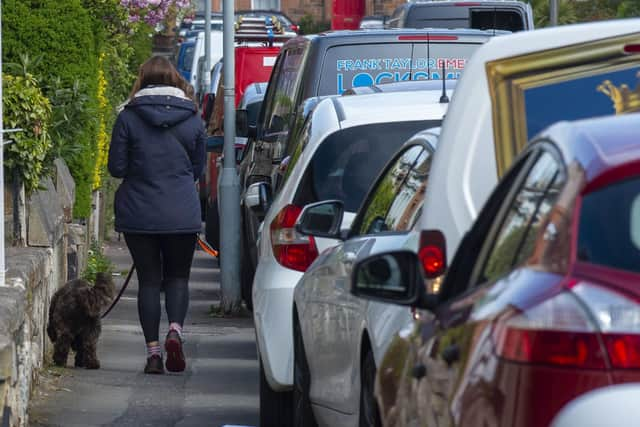Pavement parking ban a victory for the vulnerable but will drivers stomach it? – Alastair Dalton
Parts of the media are wont to fuel indignation among drivers with “War on Motorists” type headlines, but that’s normally about the prospect of them having to pay more for fuel or for use of the roads.
However, the impending measure I’m talking about is far closer to home, literally – the right to park your car in front of your house.
Advertisement
Hide AdAdvertisement
Hide AdFor some, parking is a key factor in choosing where to live, especially its proximity, if you don’t have a driveway.
It’s bad enough if your local council decides to introduce paid-for residents’ parking permits, although that in theory should make it easier to find a space, albeit at a price.
But if plans come along that remove the available parking altogether, all hell might break loose.
That’s what could be triggered by the ban on pavement parking, approved by MSPs three years ago but not now likely to be introduced until next year at the earliest.
The need for it is obvious – vehicles blocking pavements for pedestrians, especially those with wheelchairs and pushchairs who can’t physically squeeze through whatever gap is left, and face having to take a longer route, or, more likely, risk their safety by stepping onto the road.


My most vivid memory of this is the breath-taking selfishness of a mother driving her toddlers to nursery, who justified parking her bulky 4x4 on the pavement outside the front door because she needed to keep her children “safe”.
As her vehicle mounted the kerb, it's just as well she didn’t hit any their little friends or their parents, who were forced to negotiate the incongruous obstruction.
However, I can also understand why residents who park on pavements because their streets are too narrow to leave their cars on the road would feel aggrieved at being told they could no longer do that.
Advertisement
Hide AdAdvertisement
Hide AdIn Glasgow, and likely in many other areas, there are streets built within the last century apparently without mass car ownership in mind, some barely wide enough for parking on one side of the road, let alone both.
Where whole estates were constructed like that, there are bound to be problems trying to implement the ban.
Living Streets, which campaigns for pedestrians, has highlighted a loophole in the regulations which could mean roads being exempted where street parking would block ambulances and fire engines.
However, that’s not going to cover every road, and many vehicle owners are likely to be pretty annoyed at being forced to park elsewhere, potentially some distance away.
But we’ve mostly learned to adjust our motoring habits for the greater good: to wear a seat belt, not drink and drive, and slow to 20mph in an increasing number of urban areas.
Now we’ll need to learn that pavement parking is equally wrong – and anti-social. Everyone who uses a car needs to use the pavement too.
They have to realise they’ll need to use more of those pavements for their intended purpose when they get out of their car in the future, as they are rightly returned from being somewhere to park to somewhere on which to walk and wheel.
A message from the Editor:
Thank you for reading this article. We're more reliant on your support than ever as the shift in consumer habits brought about by coronavirus impacts our advertisers.
If you haven't already, please consider supporting our trusted, fact-checked journalism by taking out a digital subscription.
Comments
Want to join the conversation? Please or to comment on this article.
